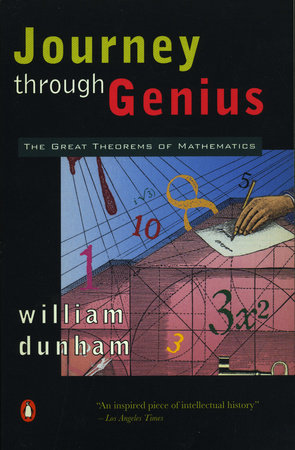Journey through Genius - William Dunham Preface
Acknowledgments
Chapter 1. Hippocrates' Quadrature of the Lune (ca. 440 B.C.)
The Appearance of Demonstrative Mathematics
Some Remarks on Quadrature
Great Theorem
Epilogue
Chapter 2. Euclid's Proof of the Pythagorean Theorem (ca. 300 B.C.)
The Elements of Euclid
Book I: Preliminaries
Book I: The Early Propositions
Book I: Parallelism and Related Topics
Great Theorem
Epilogue
Chapter 3. Euclid and the Infinitude of Primes (ca. 300 B.C.)
The Elements, Books II-VI
Number Theory in Euclid
Great Theorem
The Final Books of the Elements
Epilogue
Chapter 4. Archimedes' Determination of Circular Area (ca. 225 B.C.)
The Life of Archimedes
Great Theorem
Archimedes' Masterpiece: On the Sphere and the Cylinder
Epilogue
Chapter 5. Heron's Formula for Triangular Area (ca. A.D. 75)
Classical Mathematics after Archimedes
Great Theorem
Epilogue
Chapter 6. Cardano and the Solution of the Cubic (1545)
A Horatio Algebra Story
Great Theorem
Further Topics on Solving Equations
Epilogue
Chapter 7. A Gem from Isaac Newton (Late 1660s)
Mathematics of the Heroic Century
A Mind Unleashed
Newton's Binomial Theorem
Great Theorem
Epilogue
Chapter 8. The Bernoullis and the Harmonic Series (1689)
The Contributions of Leibniz
The Brothers Bernoulli
Great Theorem
The Challenge of the Brachistochrone
Epilogue
Chapter 9. The Extraordinary Sums of Leonhard Euler (1734)
The Master of All Mathematical Trades
Great Theorem
Epilogue
Chapter 10. A Sampler of Euler's Number Theory (1736)
The Legacy of Fermat
Great Theorem
Epilogue
Chapter 11. The Non-Denumerability of the Continuum (1874)
Mathematics of the Nineteenth Century
Cantor and the Challenge of the Infinite
Great Theorem
Epilogue
Chapter 12. Cantor and the Transfinite Realm (1891)
The Nature of Infinite Cardinals
Great Theorem
Epilogue
Afterword
Chapter Notes
References
Index



